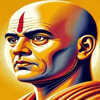 1. Chanakya Didn’t Romanticize Friendship—He Respected It
1. Chanakya Didn’t Romanticize Friendship—He Respected It We grow up with ideas like
“forgive and forget,” or
“real friends always find their way back.” But Chanakya viewed life through a lens of
rational observation, not emotional idealism.
He believed that
friendship is a contract—unwritten, but real. If broken, it deserves scrutiny, not immediate restoration.
“One must test a friend in adversity. A friend who disappears when needed was never your friend.”
Let that sink in. Real friends are revealed
not by their words, but their consistency.
2. Forgiveness Without Accountability Is Self-Sabotage

There’s strength in forgiveness—but there’s also stupidity in premature reconciliation. Chanakya’s view?
Forgive when it serves justice, not just comfort.
When we forgive too quickly:
- We skip lessons the pain was meant to teach us.
- We allow patterns to repeat.
- We send the message: “It’s okay to hurt me. I’ll let it slide.”
Forgiveness isn’t weakness—but
instant forgiveness without changed behavior is.
3. How to “Test” a Friend — Chanakya Style In
Chanakya Niti, he suggests five ways to evaluate a true friend:
In times of poverty
During crisis or war
When you’re accused or shamed
When you’re ill
When you’re on top — yes, success reveals jealous friends
“The one who stays with you in misfortune and doesn’t vanish in your storm—he is your real friend.”
So, if they vanished when you were grieving, went silent when you succeeded, or mocked your pain—maybe you’re not being “kind” by forgiving them. You’re being
blind.
4. Forgiveness Can Be Passive Aggression in Disguise Sometimes we forgive to avoid conflict. Sometimes we do it to
look like the bigger person.
But deep down, we carry resentment. That emotional buildup leaks into our future friendships.
Chanakya would call this
emotional mismanagement.
His approach? Be upfront. Either
rebuild with caution, or
walk away with clarity.
5. How to Distance Yourself — Without Guilt or Drama

Chanakya was the king of
diplomatic silence. He advised keeping
enemies close—but with boundaries.
If you’ve decided someone’s no longer good for you:
- You don’t owe them closure.
- You don’t need to explain your healing.
- You don’t have to remain friends to look “civil.”
Set limits. Be polite. Be distant. Don’t keep burning yourself to keep the friendship warm.
6. But Doesn’t Forgiveness Lead to Peace? Yes, it does. But
peace isn’t the same as access.
You can forgive someone…
…and still choose not to invite them back into your life.
…and still decide they’re not safe to trust.
…and still protect your energy.
“You may forgive, but never forget the lesson.” — That’s Chanakya’s essence.
7. The Myth of “Unconditional Friendship” In our culture, we’re taught to be loyal to a fault. But
unconditional love without mutual respect is not noble—it’s naive.
Chanakya reminds us:
“Just as a mirror reflects one’s face, a friend reflects your value.”
So if your friend:
- Keeps crossing your boundaries
- Only comes around when it suits them
- Disrespects your time, feelings, or efforts…
…it’s not a betrayal to walk away.
It’s
self-defense.
8. What I Wish I Knew Earlier I used to think setting boundaries meant I was being selfish.
Now I know:
Boundaries are what keep friendships real.
I’ve learned to:
- Forgive when I’m truly ready—not out of pressure.
- Walk away without causing a scene.
- Rebuild only when the other person takes accountability.
And honestly? It feels peaceful. Empowering.
Like I’ve finally grown up.
Friendship Isn’t About Forever—It’s About Effort

True friendship survives honesty, not just history.
So if you’ve been forgiving too quickly, too often, ask yourself:
- Are you healing… or just avoiding?
- Are you choosing peace… or fearing conflict?
- Are you being a friend to them… while abandoning yourself?
As Chanakya would say:
“He who protects himself first can protect others better.”
Explore the latest trends and tips in Health & Fitness, Travel, Life Hacks, Fashion & Beauty, and Relationships at Times Life!
 1. Chanakya Didn’t Romanticize Friendship—He Respected It We grow up with ideas like
“forgive and forget,” or
“real friends always find their way back.” But Chanakya viewed life through a lens of
rational observation, not emotional idealism.
1. Chanakya Didn’t Romanticize Friendship—He Respected It We grow up with ideas like
“forgive and forget,” or
“real friends always find their way back.” But Chanakya viewed life through a lens of
rational observation, not emotional idealism.
 There’s strength in forgiveness—but there’s also stupidity in premature reconciliation. Chanakya’s view?
Forgive when it serves justice, not just comfort.
There’s strength in forgiveness—but there’s also stupidity in premature reconciliation. Chanakya’s view?
Forgive when it serves justice, not just comfort.
 Chanakya was the king of
diplomatic silence. He advised keeping
enemies close—but with boundaries.
Chanakya was the king of
diplomatic silence. He advised keeping
enemies close—but with boundaries.
 True friendship survives honesty, not just history.
True friendship survives honesty, not just history.